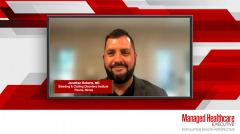Navigating Novel Hemophilia A Treatment Options: Patient Priorities and Considerations When Switching Therapies
The evolving hemophilia treatment landscape necessitates informed discussions around patient-centered therapy choices that consider patient lifestyle, treatment goals, and thrombotic risks.
Jonathan Roberts, MD: As I mentioned, many different novel therapeutics are now gaining FDA approval and are coming on the market. There are therapeutic options for our patients so we’re talking to our patients about them and they’re asking us questions about them. I think it comes down to the patient living a life free from bleeding events. So if they are on one of the standard traditional therapies that’s been on the market for 20, 30 years and they’re not bleeding, as a clinician, there’s really not a motivating factor for me to say, “You need to switch to something else.” Now, if they want to switch to something else, that’s fine. Or if they want to try a subcutaneous option, they have every right to. I think it goes into teasing out the nuances of the individual patient, what their goals are, what their priorities are, and what the risk factors are with some of these newer therapeutics. As I mentioned, as we start to manipulate the coagulation cascade in different ways with antibodies or, silencing RNAs that confer maybe Antithrombin deficiency or some of the other things that are currently in the pipeline. These different therapeutics will confer different thrombotic risks. So things that we’ve maybe not traditionally thought about in a bleeding disorder patient, once their clotting risk becomes a lot more important when you’re considering what therapy to your patient on. We have very open discussions with our patients about some of these knowns and unknowns, and then ultimately they make a decision. Certainly, the good thing about the novel therapeutics available is if they want to switch to something else later, they can, very different for gene therapy, which you can’t take back once it’s given.
Are there times when patients are switched from a therapy because of a nonmedical reason, but rather a payer reason? Again, I think this is where centers like ours really come in because we really advocate for our patients. If they are well controlled on a current therapy, we will write letter after letter and do peer-to-peer conversations to make the case for why they need to be on a particular therapy. I would say if there are 2 therapies that are relatively similar, then it all comes down to patient choice. I don’t think that a patient should be forced to use a particular therapy or not based on the payer’s financial interests. It’s the onus of the hematologists and the treatment centers to go to bat for patients and try to ensure they’re on the appropriate therapies for them. It does happen. It happens a lot more commonly in places outside the United States, I should say. In the United States, we have traditionally been fortunate to have choices in our care. If it’s different, larger systems or different insurers, sometimes maybe that choice is less. Again, as I mentioned, we try to help our patients get access to the therapy they want to be on. In Europe and some other parts of the world don’t have that opportunity. They may be limited to whatever is even available geographically in their part of the world. So it’s 2 different conversations depending on where you’re talking about. If you’re talking about the United States, we definitely advocate for our patients. If there’s a nonmedical reason that they’re trying to be forced onto a therapy to really make the case for them to stay on the therapy that they’re doing well on, sometimes with novel therapies coming out, that’s a different story. There can be limiting factors due to insurance contracts and being able to recognize the benefit of a particular therapy. So even if the FDA approves it, there can be a delay in launch where a patient can actually have access to that medicine, but maybe some people in the audience are not understanding the potential benefits of the new therapy and why the patient wants to switch. Again, that’s why they need to have a conversation with centers like ours or they can call me up and we can talk about it.
Transcript edited for clarity.
Newsletter
Get the latest industry news, event updates, and more from Managed healthcare Executive.























